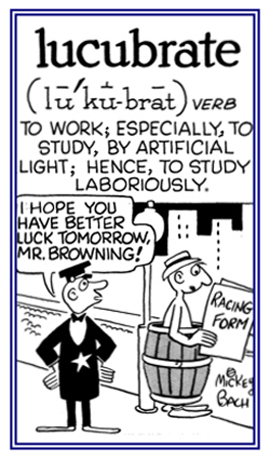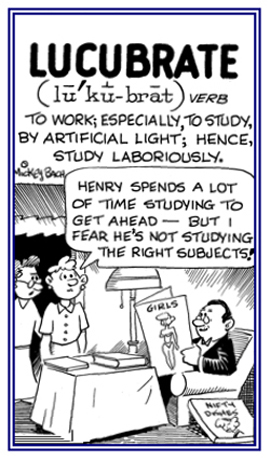luco-, luc-, luci-, lux, -lucence, -lucent
(Latin: light, lights, shine, shines, shining)
luciphile
luciphilous (adjective), more luciphilous, most luciphilous
In biology, referring to an organism that exists in open, well-lit habitats: Some deciduous trees are luciphilous and have a preference for open areas, like the oak, elm, and the Field Maple.
luciphily
Lucite
A proprietary name for a solid, transparent plastic that is made from a resin.
lucotherapy
The treatment of certain diseases, or illnesses, by exposure to light; especially, by varieties of concentrated light rays or specific wavelengths. Also phototherapy.
lucubrate (verb), lucubrates; lucubrated; lucubrating
1. To write in a scholarly fashion; to produce scholarship: Shirley was lucubrating to her fellow class mates about the main ideas that she had in her dissertation.
2. To work or to study laboriously; especially, at night: Every evening, Max spends a great deal of time lucubrating the university assignments he receives for all of his graduate classes.
3. Etymology: from Latin lucubarre, lucubart-, "to work at night by lamplight".

© ALL rights are reserved.

© ALL rights are reserved.
Go to this Word A Day Revisited Index
2. To work or to study laboriously; especially, at night: Every evening, Max spends a great deal of time lucubrating the university assignments he receives for all of his graduate classes.
3. Etymology: from Latin lucubarre, lucubart-, "to work at night by lamplight".


Go to this Word A Day Revisited Index
so you can see more of Mickey Bach's cartoons.
1. A written work resulting from prolonged study, often having a scholarly style.
2. Long hard study; especially, at night.
3. Etymology: from Latin lucubro, "to study by candle-light", from lucubrum, from lux, "light".
2. Long hard study; especially, at night.
3. Etymology: from Latin lucubro, "to study by candle-light", from lucubrum, from lux, "light".
lucubrator (s), lucubrators (pl) (noun forms)
A person, or people, who studied by candle-light or a lamp.
lucubratory (adjective)
1. A reference to writing in a scholarly fashion.
2. A descriptive term for producing scholarly materials; especially, at night by candle light.
2. A descriptive term for producing scholarly materials; especially, at night by candle light.
luculence (noun), luculences (pl)
An explanation of why something happened or is going on: "It would be great if Mark's luculence for not going to work yesterday can be supported with a legitimate reason."
luculent (adjective), more luculent, most luculent
Descriptive of clarity and something that is easy to comprehend: "The flowers in Dina's apartment indicate lucent reasons for giving them water before they dry out."
luculently (adverb), more luculently, most luculently
A reference to making clear and easy to comprehend statements or explanations: "Mr. Smith was luculently showing his students how to increase their vocabulary skills by learning more about Greek and Latin sources of English words as they appear in family units."
1. In physics, the SI unit (International System of Units) of luminous flux, equal to the amount of brightness crossing a unit area at a distance from a light source of intensity of one candela (symbol lm): The lumen is based on the spectral sensitivity of the photosensors in the human eyes under high (daytime) radiant levels.
2. In anatomy, the space inside any tubular structure in the body: Some of the body tubes, which provide lumen, include the intestines, arteries, and veins.
2. In anatomy, the space inside any tubular structure in the body: Some of the body tubes, which provide lumen, include the intestines, arteries, and veins.
The surgeon, Dr. Smith, could determine whether there was a blockage in the lumen of his patient's intestine.
3. In botany, the cavity within a plant cell wall: The assignment to the students by the botany instructor, Mr. Jones, was to make detailed drawings of the lumen of three different plants, in order to compare their cellular construction.
1. A material that sends out light by absorbing and then converting a portion of incident energy: The students observed that the ocean was glowing and concluded that there was a lot of luminophore in the water which absorbed radiation and produced a glowing effect.
2. An atom or atomic grouping in an organic compound that increases its ability to produce light: The marine biologists were studying how to increase the luminophore in certain oceanic organisms and thereby increase the ability of such organisms to phosphoresce.
2. An atom or atomic grouping in an organic compound that increases its ability to produce light: The marine biologists were studying how to increase the luminophore in certain oceanic organisms and thereby increase the ability of such organisms to phosphoresce.
A standard measure of the responses of the eyes to monochromatic (one color) light at various wavelengths: As part of her research, the ophthalmologist, Dr. Robinson, studied the changes in the luminosity functions of the eyes of her patients.
Etymologically related "light, shine, glow" word families: ethero-; fulg-; lumen-, lum-; luna, luni-; lustr-; phengo-; pheno-; phospho-; photo-; scinti-, scintill-; splendo-.


